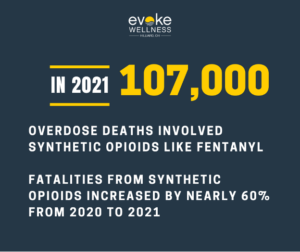As the leading cause of overdose deaths across America, fentanyl demands your understanding. With potency up to 100 times stronger than morphine, this synthetic opioid poses extreme risks that you must comprehend to protect yourself and your loved ones. This article provides the critical details on fentanyl overdose symptoms, alarming statistics, and actionable solutions from Evoke Wellness at Hilliard. Arm yourself with lifesaving knowledge on recognizing overdose signs, accessing emergency help, and overcoming addiction through proven treatment programs. You have the power to face this crisis with awareness and resolve. Knowledge and vigilance are your keys to saving lives from fentanyl’s deadly grip.
Addiction Treatment
Evoke Wellness at Hilliard offers comprehensive addiction treatment programs, including:
- Fentanyl addiction treatment
- Painkiller treatment
- Drug detox center
- Addiction therapy programs
- Inpatient rehab and outpatient rehab
If you or a loved one is considering treatment, Evoke Wellness at Hilliard invites you to contact us. Our compassionate team is ready to answer your questions, discuss your needs, and help you take the first steps toward recovery. In Hilliard, you’ll find more than just a treatment program – you’ll discover a community dedicated to your wellness and success. Together, let’s embrace the journey to recovery and the promise of a new beginning. Call us at (833) 949-1347 today or reach out online.
What Is Fentanyl?
A Powerful Synthetic Opioid
Fentanyl is a powerful synthetic opioid that is 50-100 times more potent than morphine. It is prescribed for severe pain, but is also made illegally and distributed through illicit drug channels.
Highly Addictive and Deadly
This drug produces euphoric effects similar to heroin, making it highly addictive. Even tiny amounts can cause respiratory depression and death from overdose.
Concerning Statistics
Evoke Wellness at Hilliard offers comprehensive treatment for fentanyl addiction, including medical detox, therapy, and aftercare planning. Call today to begin your recovery journey.
Fentanyl Statistics and Facts
Potent and Deadly
Fentanyl is a powerful synthetic opioid drug, up to 100 times stronger than morphine. Even tiny amounts can prove fatal – just 2 milligrams is a potentially lethal dose.
Overdose Surge
- Overdose deaths involving synthetic opioids like fentanyl increased over 56% from 2019 to 2020 in the U.S.
- Over 107,000 Americans died from drug overdoses in 2021, with 67% of those deaths related to synthetic opioids like fentanyl.
Hidden Dangers
Fentanyl is often added to other illegal drugs like cocaine, heroin, and counterfeit pills without the user’s knowledge. This hidden presence dramatically increases overdose risks.
Treatment Options
Overcoming fentanyl addiction requires comprehensive treatment, including medical detox, counseling, and aftercare planning. Evoke Wellness offers specialized programs designed to address opioid use disorders safely and effectively.
Fentanyl Overdose Symptoms
Signs of an Overdose
If someone is experiencing a fentanyl overdose, they may exhibit signs such as:
- Extreme drowsiness or unconsciousness
- Constricted or pinpoint pupils
- Slow, shallow breathing or respiratory depression
- Cold, clammy skin
- Bluish tint to lips or nails
Act Quickly
An overdose can lead to coma, brain damage or death if not treated immediately. If you suspect an overdose, call 911 right away. Administer naloxone if available to temporarily reverse the overdose effects.
Our compassionate team provides evidence-based care to help you or a loved one overcome opioid addiction safely.
What to Do if You Suspect a Fentanyl Overdose
If someone is experiencing a fentanyl overdose, it’s crucial to act quickly. Signs include severe drowsiness, constricted pupils, slow breathing, and loss of consciousness.
Call Emergency Services
Immediately call 911 or your local emergency services. Fentanyl overdoses can be life-threatening, so rapid medical intervention is essential.
Administer Naloxone
Naloxone is a medication that can temporarily reverse an opioid overdose. If available, administer naloxone nasal spray or injection following the product instructions. Naloxone is not a substitute for emergency medical care.
Perform Rescue Breathing
If the person stops breathing, perform rescue breathing or CPR until help arrives or the person regains consciousness. Fentanyl depresses respiratory function, making rescue breaths critical.
Fentanyl Addiction Treatment Programs
If you or a loved one is struggling with fentanyl addiction, seeking professional help is crucial. Overcoming this powerful opioid requires comprehensive treatment programs tailored to individual needs.
Inpatient Rehabilitation
Inpatient or residential rehab centers provide a safe, controlled environment to undergo detox and intensive therapy. Medical staff monitor withdrawal symptoms and administer medications to ease cravings and discomfort. Behavioral therapies, counseling, and support groups address the psychological aspects of addiction.
Outpatient Programs
For those unable to leave work or family obligations, outpatient programs offer flexibility. Patients attend regular therapy sessions while continuing daily routines. Intensive outpatient programs provide a higher level of care through more frequent meetings.
Medication-Assisted Treatment
Medications Management like methadone, buprenorphine, and naltrexone can help manage cravings and withdrawal symptoms. Combined with behavioral therapies, these FDA-approved drugs increase the chances of lasting recovery from opioid addiction.
Aftercare and Support
Recovery is an ongoing journey. Aftercare services, such as sober living homes, alumni programs, and 12-step meetings, provide a supportive community and accountability to maintain sobriety long-term.
Fentanyl Detox and Therapy Programs
Medical Detox
Fentanyl withdrawal can be extremely uncomfortable and even life-threatening. A medical detox program provides around-the-clock supervision and medications to help manage cravings and withdrawal symptoms safely.
Inpatient Treatment
After detox, an inpatient or residential program allows you to live at the treatment facility while receiving intensive therapy and support. This removes access to fentanyl and provides a safe, drug-free environment.
Outpatient Programs
For those with a strong support system at home, outpatient programs provide therapy sessions a few times per week while you live at home. Intensive outpatient programs meet more frequently than standard outpatient care.
Medication-Assisted Treatment
Medications like buprenorphine, methadone, and naltrexone can help reduce cravings and withdrawal during detox and long-term recovery. They are often used in combination with behavioral therapies.
Frequently Asked Questions About Fentanyl Addiction and Overdose
What is fentanyl?
- A powerful synthetic opioid 50-100 times stronger than morphine.
- Legally prescribed for severe pain, but also made and used illegally.
How addictive is fentanyl?
- Extremely addictive due to its potency and fast-acting effects.
- Can quickly lead to dependence and withdrawal symptoms upon stopping.
What are signs of a fentanyl overdose?
- Slowed or stopped breathing, dizziness, confusion.
- Cold, clammy skin, pinpoint pupils, loss of consciousness.
How common are fentanyl overdoses?
- Fentanyl was involved in over 70,000 overdose deaths in the U.S. in 2021.
- Overdoses are rising due to fentanyl being mixed into other illegal drugs.
Conclusion
While fentanyl overdoses have tragically become all too common, there is hope. With proper medical care and support, recovery from fentanyl addiction is possible. Entering a drug detox program can help manage withdrawal symptoms under medical supervision. Following detox, enroll in an addiction treatment program that provides therapy to address the underlying causes of addiction. Join a support group to connect with others on the same journey. There are many resources available, so reach out for help. Your life is precious – take the first step today towards healing and reclaiming your future.
Begin Your Journey with Evoke Wellness at Hilliard
If you or a loved one is considering treatment, Evoke Wellness at Hilliard invites you to contact us. Our compassionate team is ready to answer your questions, discuss your needs, and help you take the first steps toward recovery. In Hilliard, you’ll find more than just a treatment program – you’ll discover a community dedicated to your wellness and success. Together, let’s embrace the journey to recovery and the promise of a new beginning. Call us at (833) 949-1347 today or reach out online.



